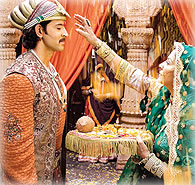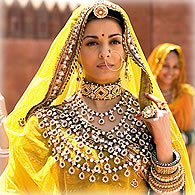Ashutosh Gowarikar has none other than Maharani Padmini of Jaipur to vouch for the authenticity of his yet to be released period film "Jodhaa Akbar".
The Jaipur Maharani, who flew to Mumbai for the music launch of "Jodhaa Akbar", was accompanied by a host of her relatives.
At a function in a suburban hotel Wednesday evening, Rani Padmini chose to speak about her take on the star-studded movie, which depicts the love life of Mughal emperor Akbar and his wife and the Rajput princess Jodha.
"I have watched parts of the film and I can say that Gowarikar has presented the Rajput viewpoint regarding their links with the Mughals without any distortion," Maharani said.
She told the gathering that both UTV's Ronnie Screwwala and director Gowarikar were in touch with her during the making of the film.
"A period film about an important chapter of Indian history could not have been more authentic," Maharani Padmini said with a girlish enthusiasm.
Hrithik Roshan and Aishwarya Rai-Bachchan, who play the roles of a young Akbar and nubile princess Jodhabai respectively, were welcomed with loud cheers at the venue.
Accompanying Hrithik were his designer wife Suzanne, in-laws Sanjay Khan and Zarine Khan and actor brother-in-law Zayed Khan. Aishwarya came with her father-in-law Amitabh Bachchan, who was also the special guest at the event.
Shatrughna Sinha came with his wife Poonam, who essays the role of Akbar's mother in the movie.
"Jodhaa Akbar", billed the most expensive Hindi movie made at a cost of Rs.450 million (Rs.45 crore), is slated for release worldwide Feb 15.
Veteran lyricist Javed Akhtar has penned the songs and maestro A.R. Rahman has composed the music.
Courtesy: Mangalorean.com




 At long last! After months of delays and countless rumours, the music for Ashutosh Gowariker’s monumental Jodhaa Abkar (JA) has finally been released. As you will no doubt be aware, the epic portrayal concerns the life and times of the 16th Century Mughal emperor Zalaluddin Akbar and in particular his romance with a Rajput Princess, Jodhaa. Never mind the movie, there has been just as much anticipation for the soundtrack but why all the hype you may ask? Well it’s all to do with the magical partnership of the Director / Music Director and their previous successes.
At long last! After months of delays and countless rumours, the music for Ashutosh Gowariker’s monumental Jodhaa Abkar (JA) has finally been released. As you will no doubt be aware, the epic portrayal concerns the life and times of the 16th Century Mughal emperor Zalaluddin Akbar and in particular his romance with a Rajput Princess, Jodhaa. Never mind the movie, there has been just as much anticipation for the soundtrack but why all the hype you may ask? Well it’s all to do with the magical partnership of the Director / Music Director and their previous successes. For those who believe in omens, here is a good one. A R Rahman brings in the new year with some awesome music for Jodhaa Akbar. Now, hopefully, the rest of the composers can keep up.
For those who believe in omens, here is a good one. A R Rahman brings in the new year with some awesome music for Jodhaa Akbar. Now, hopefully, the rest of the composers can keep up.